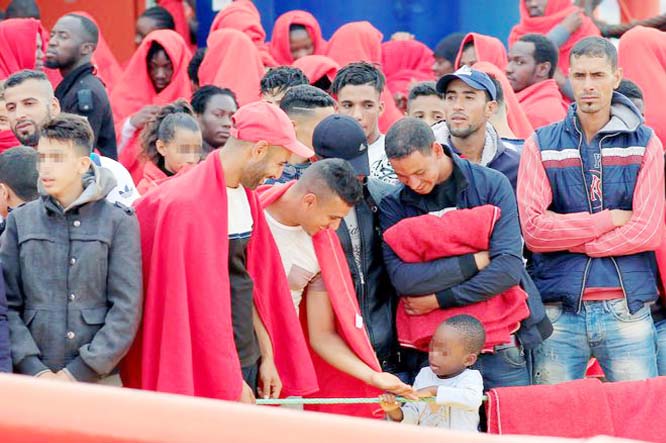
AFP, Barcelona :
Spain is struggling to accommodate thousands of young migrants who over the years have arrived alone on rickety boats or hidden in trucks, some of whom have ended up on the streets or even become involved in crime.
There are currently around 14,000 unaccompanied young migrants in Spain, according to the government, up from just around 4,000 in 2016.
In regions like Catalonia in Spain’s northeast, which has a large Moroccan community that attracts the youngsters after they arrive in the south, reception centres are overwhelmed.
In Barcelona, dozens sleep rough on benches, in parks or in makeshift camps hidden in the hills that surround this Mediterranean seaside city.
“They’re damaged, many sniff glue. And they’re very vulnerable on the street, criminal gangs take advantage and get hold of them,” Peio Sanchez, a priest in charge of the Santa Anna church where young migrants sleep regularly, tells AFP.
In front of the church in a small, hidden square near the popular Ramblas avenue in Barcelona, two teenagers share a cigarette as they play on their mobile phones.
One of them sleeps in a juvenile centre. The other, Sofiane, lives on the street.
His child’s thin and short body contrasts sharply with his hard appearance, his cheek scarred.
Orphaned when he was 10, he emigrated from Morocco to Spain hidden underneath a truck. He was sent to various centres far from Barcelona, but always ended up coming back to the city.
“My friends are here, my life is here,” he says.
Adria Padrosa, a social worker at the church, says they persuaded him to go to a centre several weeks ago, but he returned the following day.
“He’s a complicated profile, very used to living on the streets,” he says.
The majority of the migrants the church tends to are no longer underage.
They were when they came to Spain, but when they turned 18 they were no longer given protection or support.
Spain automatically gives minors a residency permit but not a work one.
They can get a work permit after five years in Spain or if they get an annual full-time contract, which is hard to come by in a country with 32 percent unemployment among under 25s.
“You turn 18 and that’s it. They give you your suitcase, they kick you out and bye bye,” says Najib Benyaala, a 21-year-old Moroccan with curly hair he’s dyed blonde.
Spain is struggling to accommodate thousands of young migrants who over the years have arrived alone on rickety boats or hidden in trucks, some of whom have ended up on the streets or even become involved in crime.
There are currently around 14,000 unaccompanied young migrants in Spain, according to the government, up from just around 4,000 in 2016.
In regions like Catalonia in Spain’s northeast, which has a large Moroccan community that attracts the youngsters after they arrive in the south, reception centres are overwhelmed.
In Barcelona, dozens sleep rough on benches, in parks or in makeshift camps hidden in the hills that surround this Mediterranean seaside city.
“They’re damaged, many sniff glue. And they’re very vulnerable on the street, criminal gangs take advantage and get hold of them,” Peio Sanchez, a priest in charge of the Santa Anna church where young migrants sleep regularly, tells AFP.
In front of the church in a small, hidden square near the popular Ramblas avenue in Barcelona, two teenagers share a cigarette as they play on their mobile phones.
One of them sleeps in a juvenile centre. The other, Sofiane, lives on the street.
His child’s thin and short body contrasts sharply with his hard appearance, his cheek scarred.
Orphaned when he was 10, he emigrated from Morocco to Spain hidden underneath a truck. He was sent to various centres far from Barcelona, but always ended up coming back to the city.
“My friends are here, my life is here,” he says.
Adria Padrosa, a social worker at the church, says they persuaded him to go to a centre several weeks ago, but he returned the following day.
“He’s a complicated profile, very used to living on the streets,” he says.
The majority of the migrants the church tends to are no longer underage.
They were when they came to Spain, but when they turned 18 they were no longer given protection or support.
Spain automatically gives minors a residency permit but not a work one.
They can get a work permit after five years in Spain or if they get an annual full-time contract, which is hard to come by in a country with 32 percent unemployment among under 25s.
“You turn 18 and that’s it. They give you your suitcase, they kick you out and bye bye,” says Najib Benyaala, a 21-year-old Moroccan with curly hair he’s dyed blonde.

